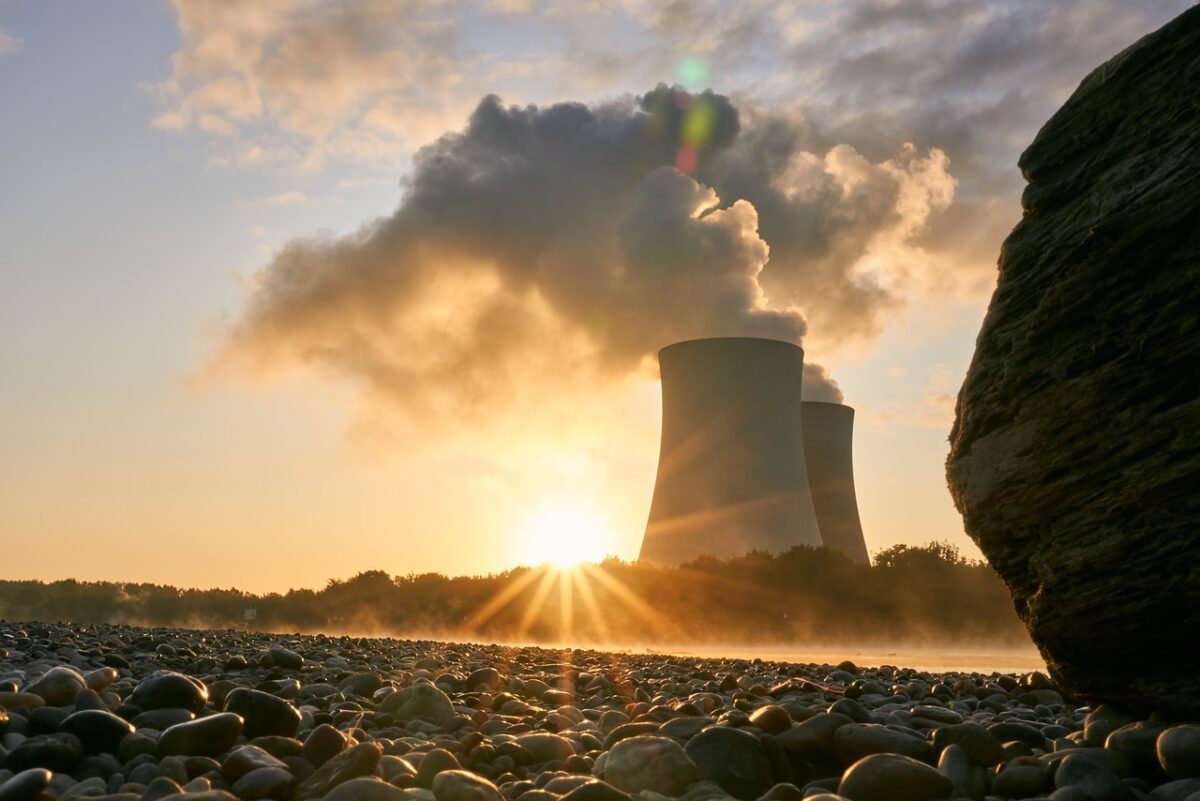- cross-posted to:
- technology@lemmy.world
Chasing profit is how we got here. This shouldn’t be the basis of the decision. If it’s the only thing we can use to drag conservatives along though, I guess it’ll have to do.
It’s not about chasing profit though, it’s about getting to net zero as quickly as possible using finite resources. Any money that goes to nuclear could be going to renewables, which would get us there more quickly.
Any money that goes to nuclear could be going to renewables, which would get us there more quickly.
That’s a false dilemma. Nuclear and renewables provide different things, so they shouldn’t be compared directly and certainly not on cost. Nuclear power provides a stable baseline, so you don’t have to rely on coal/gas/diesel powered generators. Renewables cheaply but opportunistically provide power from natural sources that may not always be available but that can augment the baseline. The share of renewable energy in the mix is something engineers should figure out, not “the market”.
Also, monetary cost shouldn’t be the only concern. Some renewables have a societal cost too, for example in the amount of land that they occupy per kWh generated, or visual polution. I wouldn’t want to live within the shadow flicker of a windmill for example.
baseline
Base load. Here’s an argument that we don’t need it: https://cleantechnica.com/2022/06/28/we-dont-need-base-load-power/
There’s an interesting point buried at the end of that article: electricity quality. With batteries in the loop, supply can scale with demand almost instantly, versus the time it takes for various types of power plant to adjust output.
There’s an equally buried link to a death by powerpoint that made me pray for a blackout before i could get anywhere close to understanding how that bar graph was constructed.
I can’t vouch for the following being a necessarily better source, but this one seem a lot more upfront about some of their assumptions and sensitivities. In this adding storage to wind is seems to be +tens of dollars per MWh; a fair amount more than the +1-3 dollars per MWh shown in the cleantech article.
https://www.lazard.com/research-insights/2023-levelized-cost-of-energyplus/So i’d like to know where these cheap battery cost assumption comes from - is it proven tech, available at scale , at that price?
just seems a bit too good to be true.
Reading that… It basically seems to say that we can live with intermittent blackouts when wind and solar fail.
They don’t provide different things, they both provide electricity. Nuclear is only really suited to base load, whereas renewables can be spun up and down to match varying demand - however renewables are also more than capable of covering base load, because it’s all just electricity.
The only thing nuclear provides that renewables don’t is grid stability. Nuclear turbines have large rotating masses, when loads are switched on and off they keep spinning the same speed, helping to maintain voltage and frequency. Meanwhile renewables are almost all run via inverters, which use feedback loops to chase an ideal voltage and frequency, but that gives them an inherent latency when dealing with changes on the network. However, there are other ways of providing grid stability.
It’s not a windmill. It doesn’t mill anything. The technical term is Wind Turbine Generator (WTG), but usually they’re called wind turbines or just turbines. A group of turbines make up a wind farm.
Land occupied is not much of a concern when most renewables (and nuclear, for that matter) tend to be installed away from population centres. It feels like you’re grasping for reasons now.
Suffice it to say, I work in the electrical industry, and this isn’t the first report that’s come out saying renewables are cheaper, better value and quicker to build and get us to net zero when compared to nuclear. That isn’t to say nuclear isn’t important and shouldn’t be built, just that nuclear shouldn’t be a priority in pursuit of phasing out fossil fuels. At the end of the day, demand will only go up, so building a lot of renewables before building nuclear won’t exactly be going to waste. We’ll need all of it.
Renewables cannot be spun up. You have to massively over build to do that. And even then, you’re still depending on availability of sun and wind.
If you need more power than is available, it’s done with natural gas peaker plants at 10x the normal cost of electricity.
On the flip side, a stable base load of nuclear, can be spun up and down over the day to meet expected load.
That’s exactly the suggestion, over-build renewables right now to get to net zero, then fill out the generation portfolio with nuclear. The demand will only go up, so that excess renewables will eventually be used to capacity anyway. The study is laying out what the priority should be right now, when climate change has already got its foot well in the door.
Renewables can effectively be spun up or down as long as they have batteries. That way, they can usually be generating as much energy as possible regardless of demand.
In that case it’s the batteries being loaded and unloaded, not the renewables.
Storage can be connected to the grid anywhere and charged whenever power is cheap - from whatever sources are generating at that time. It is effectively an independent investment - assuming your on-grid / grid scale.
As far as i know the only major renewable electricity generation that is intrinsically linked to storage is reservoir based hydro with reverse pumping capability though even that increases costs and is a quite situation dependent if you want a lot of peaking power…
Nuclear fanboys could equally argue to add batteries so as to convert baseload into shape, or peaking.
is our battery tech even up to this?
Yes. There’s numerous live examples which have been in place for years (Horndale South Australia for example)
Yes. It costs less and requires less mining to use the most expensive and wasteful storage option. The only reason there aren’t more is a lack of sufficient investment in VRE required to make them useful.
Two’s a crowd: Nuclear and renewables don’t mix
Only the latter can deliver truly low carbon energy, says new study
https://www.sciencedaily.com/releases/2020/10/201005112141.htm
If countries want to lower emissions as substantially, rapidly and cost-effectively as possible, they should prioritize support for renewables, rather than nuclear power.
Seriously. By this logic fossil fuels are cheaper, thus better!
This is how we get garbage like carbon credits, trying to capture the cost to the environment in dollar amounts is just more symptoms the fallacy of using economics in lieu of physics.
The question has always been what does one do when the renewables aren’t providing enough power (ex: nights, etc). The current solution is natural gas. It would be a big improvement if we would use a carbon-free source like nuclear instead.
According to the article, the researchers concluded that nuclear reactors are not a good fit for that role.
The growing idea is to just have a shit load of renewables, everywhere. The wind is always blowing somewhere, and the sun shines through the clouds. If you have a ridiculous excess total capacity then even when you’re running at limited capacity you could still cover the demand. Basically, most of our renewable infrastructure would actually be curtailed or offline a lot of the time.
And that opens up opportunities for energy intensive industries like aluminium or hydrogen production to run whilst there’s an excess of energy
I’m all for green hydrogen production, it’s using hydrogen in place of fossil fuels that bothers me. We already have a shit load of demand for hydrogen from industrial uses, and it would take 3x the world’s total renewable capacity in 2019, dedicated solely to hydrogen production, to meet this with green hydrogen. If we start adding transportation into that demand we’ll never make it, and it will be far less efficient than other energy sources (eg batteries).
So yeah, we should have green hydrogen production, but we shouldn’t listen to those same people when they say they think it should also be used for transportation. That’s just trying to increase the size of the market to increase profits.
Hydrogen works well with a renewable grids because you can take advantage of the times there is excess energy production so that power doesn’t just go to waste.
We do need to be careful because hydrogen is often sold as a pipe dream by gas companies to convince us to use gas (e.g. “this new gas turbine power plant can be converted to hydrogen”, even though that’d be a workload less efficient than fuel cells).
As for its use in transport, it looks like battery electric vehicles have won that battle for personal vehicles. Both have their advantages but in practice there are few enough fuel stations for hydrogen and enough chargers that that’s not going to flip.
However, batteries are entirely unsuitable to long distance, high load transport like trucks. Ideally they’d be replaced by rail, but that’s not happening anytime soon in many places so hydrogen likely will be the solution there.
consumers may also help reduce system costs by adapting their electricity consumption to the availability of renewable energy
From the linked paper. They mention some other options for storage like batteries (plenty of environmental issues there though) but based on the quoted text I have a hard time taking this seriously if they actually expect people to change their behavior.
Plug in car. Press the “I would like to only pay $100/yr to fuel this please” button.
Later when you leave for work press the “I would like the house to be cool when I get home and also want to pay half as much for AC” button.
Such an unconscionable burden.
I think innovation at the consumption end is going to help a lot. On Technology Connections I saw an electric induction stove that could be powered from a regular socket. It had a battery that would trickle charge throughout the day and then use the batteries to power the induction cooktops, as well as a couple of plugs. If widely deployed and in other appliances, with a little smarts that could provide power leveling at the home level.
Another solution would be adding some intelligence to water heaters. Have a temperature control valve on the output where you set the temperature, and program the water heater get to 160-180°F when electricity is cheap. This would be a thermal battery that would easily level out demand for electricity for heating water.
Or you could do thermal storage by heating a house very warm/cold prior to a large cold snap/heat wave, and letting it coast down/up to a temperature instead of heating/cooling a lot during the cold/hot weather. He’s got a video on this technique here
Another solution would be adding some intelligence to water heaters. Have a temperature control valve on the output where you set the temperature, and program the water heater get to 160-180°F when electricity is cheap. This would be a thermal battery that would easily level out demand for electricity for heating water.
This has been done for close to a century in wind or run of river hydro heavy countries (as well as some coal ones).
The water heater has a buffer tank and is attached to a meter that only runs when a signal is sent across the power line. This stores about 20kWh for a 300L tank.
Modern insulation would allow going up to a few m^3 for a couple weeks’ worth.
Combine that with some radiant floor heating on a nice thick concrete slab and you could use the battery for home heating. (Though it would need a lot of water.)
Here is an alternative Piped link(s): https://piped.video/watch?v=0f9GpMWdvWI
Piped is a privacy-respecting open-source alternative frontend to YouTube.
I’m open-source, check me out at GitHub.
“Not enough power from renewables? Just turn off your fridge for a few days and you’ll be fine!”
Honestly that sentiment has strong “blame the consumer” vibes that seems to pervade climate arguments.
Sure, people can reduce consumption, but at best its a stopgap, not a solution.
There’s stuff like heaters and to a degree things like washing machines that can shape the time they’re active to whenever there’s a lull.
Consider Britain: Each time the BBC runs a popular show you get an energy usage spike once it’s over because people are getting up and make themselves a cuppa. Doesn’t really make sense to run the heater in the tank for your shower at the same time, or charge your car, that can wait a bit.
We have to start looking at personal renewables more? Each home could have their own small windmill or solar panel. Let’s point in that direction.
What makes you think personal renewable are going to be more efficient than large scale renewables? The sun doesn’t magically shine in the middle of the night on personal homes, the wind doesn’t magically blow only in residential areas…
The best solution is having EVs plugged into the grid at night. VTG is the easy solution to peaker needs.
While I agree completely, it is troublesome that you, BombOmOm, are saying this… :/ username checks no fly list out.
Sometimes, a kinetic response is the only reasonable reaction. ;p Asking nicely doesn’t stop a Russian war of conquest.
Nuclear is a terrible fit for peaker plants, that’s not how it works. If it isn’t selling energy at as close to 100% of the time as is feasible it’s losing money.
at night perhaps they could sleep
The renewables-only crowd is just ignorant about this simple fact.
The future of energy will be dominated by solar and nuclear power. With hydro, geothermal and wind playing supporting roles, depending on geography.
The only question is, how much fossil fuels do we burn until then?
Those who oppose nuclear are really just in favour of burning fossil fuels in the interim. But the inevitable switch to nuclear will come as fossil fuels are depleted.
Nature has given us the atom as the most dense and durable way to store energy. That will never change.
Typical energy density of ore in a new uranium mine burned in an LWR is about the same of coal.
All of the economic/not too damaging stuff together would power the world for about 3 years.
Pumped-storage hydroelectricity is an old and proven method for load balancing intermittent power sources. Would like to see more of that as geography permits.
The “as geography permits” part is a big obstacle, unfortunately.
Nuclear is not, and cannot be, a gap coverage solution. Due to xenon/iodine poisoning and decay heat management you need to keep a reactor critical as long as possible to be economical. That’s independent of the problem of keeping the water hot that fossil fuel generators share. You can’t just turn a reactor on and off.
It can provide a baseload though where solar can provide extra power during the heat for places where the summer and days are the power intensive part, rather than winter and nights. You still need a short-term stop gap as the sun sets but it’s still hot out, but even if that was just powered by NG it would be a huge step forward. Adding greener energy storage options to store extra power nuclear or wind could generate overnight would be better.
Btw, could a small percent of nuclear reactors be turned on/off seasonally, potentially transporting fuel between the north in the winter and the south in the summer?
Yes, but if you spend the money making a reactor, you really should just use it. Uranium is pretty cheap, it’s the reactor that’s expensive.
Fair. If a grid was just powered by batteries, solar, wind, and existing nuclear plants, which would be the most effective to turn off when demand is too low?
Keep the reactors running to avoid that issue. As long as they are providing enough power when the renewables aren’t, we successfully cut out natural gas from the power grid.
Columbia station load follows within a certain range set by nearby hydro. It can be done. The economics aren’t even that bad, as fuel is one of the cheaper inputs to the reactor.
Profitability is so much not the point here and also, there’s no reason for different energy production sources (especially ones that are base power vs incidental power) to be in conflict. Do both of them.
We don’t have to like it but unfortunately profitability is by far the number one driver for…well everything. So little is accomplished by way of altruism. People are greedy. The best way to successfully incentivize climate action is for environmentally friendly actions to become the most profitable and be advertised as such.
So I agree with you that both options should be used. But I disagree that profitability is not the point. Money is always the point and always has been.
Price of energy is key to the success of every economy.
Yeah exactly. None of it is profitable if you can’t meet instant demand changes at any time of day. Build the nukes to meet full demand needs and supplement them with “more profitable” options for redundancy.
None of this is profitable if you can meet demand power at will either.
It’s just a scarcity game that those in power use to keep things ticking along.
What is infrastructure to most, is a tuned revenue machine to a very few.
The purpose of a system can be determined by its output, and it’s working quite well in that aspect.
I’ve never had a rolling black out or brown out but we burn coal around here and there are proposals for some small nuclear sites. Yes there’s some solar and wind as well but we are a net exporter of energy to the western states.
There is, actually, a conflict. Renewables are more dynamic in production. You can turn them on and off quickly, you can scale them quickly too. You can’t do that with nuclear plants. Baseload is not a goal, it’s a limit. That’s why the nuclear energy sector is friends with the coal sector.
Example of Nuclear-Coal friendship from Poland: https://twitter.com/stepien_przemek/status/1642908210913853442
Example of Nuclear-Coal friendship from the USA: https://www.energyandpolicy.org/generation-now-inc/
A deeper understanding here: “The duck in the room - the end of baseload” https://jeromeaparis.substack.com/p/the-duck-in-the-room-the-end-of-baseload
Baseload is not a goal, it’s a limit.
I would love to know what oil company you heard that from, since it’s absolutely not true. You can both turn them off quickly (faster, in fact, than LNG or Coal), start them up quickly (sub minutes) and change production quickly. These have all been features since 1960’s era reactors, and we’re around 10 generations past them.
I think they might be referring to turning down the reactors, which I think is an actual difficulty with them. By no means however is it a reason to not use them, it just means you employ it wisely. Have it meet most of the demand, and use solar and wind and others to supplement to full demand.
That’s not difficult. Nuclear is extremely expensive.
With renewables you just sell it to the grid for whatever gas generated electricity is going for. Which is currently still a fucking lot. Thanks Russia.
Removed by mod
Thanks Russia.
Oh, it gets worse. Russia is big on nuclear, they have a whole agency that deals in nuclear in Europe, it’s called ROSATOM.
This is related to other post with the fossil-fuel sponsored ecomodernist girl whining about Greenpeace and nuclear:
Russia lobbied to have the EU include nuclear energy and fossil methane to be included in the “sustainable” taxonomy: https://www.greenpeace.de/publikationen/20220517-greenpeace-report-russland-taxonomie.pdf (PDF)
Russia has a good stranglehold on nuclear energy: https://www.bloomberg.com/news/features/2023-02-14/russia-s-grip-on-nuclear-power-trade-is-only-getting-stronger and many European powers …compliant to that.
Russia’s nuclear trade with Europe flowing amid Ukraine war https://web.archive.org/web/20221011224411/https://abcnews.go.com/International/wireStory/russias-nuclear-trade-europe-flowing-amid-ukraine-war-90691865
European Union nations are continuing to import and export nuclear fuel that is not under EU sanctions on Russia
Russia’s Grip on Nuclear-Power Trade Is Only Getting Stronger https://www.politico.eu/article/russia-nuclear-power-uranium-plants-europe-imports-germany-sanctions-ukraine-war/
New data show exports in the strategic industry jumped more than 20% last year, as long-term projects boost Russian influence.
Here’s an article in German: https://www.spiegel.de/wirtschaft/unternehmen/uran-abhaengigkeit-russland-koennte-den-usa-noch-erhebliche-schmerzen-zufuegen-a-cad81a53-4704-4842-a641-1b6191e4add5
It’s even more complicated, but building nuclear now in Europe would mean more dependency on Russian nuclear fuel and nuclear tech.
This includes France, the nuclear postergirl:
French Nuclear Power Crisis Frustrates Europe’s Push to Quit Russian Energy https://www.nytimes.com/2022/06/18/business/france-nuclear-power-russia.html
France typically exports electricity, but now it risks blackouts and a need for imported power because of problems at the state nuclear operator.
France accused of funding Putin’s war effort by buying his nuclear fuel https://www.telegraph.co.uk/world-news/2022/12/02/france-accused-aiding-putins-war-importing-russian-nuclear-fuel/
It’s not just complicated, with many limits, but the useless yammer of nuclear-fanboys is just using up air in discourse.
Building more nuclear will not help with with climate warming mitigation. And it has its own problems with climate, as France knows…
(most recent time this happened, again) France to reduce nuclear power generation due to heat wave https://www.laprensalatina.com/france-to-reduce-nuclear-power-generation-due-to-heat-wave/ from a few weeks ago.
Nah, the power company likes the profits from nuclear way better.
The secret is that they can bill the ratepayers for all the cost overruns, while keeping the extra profits on the cost-plus construction contract for the shareholders.
(Source: I’m a Georgia Power ratepayer being absolutely reamed for Plant Vogtle 3 and 4, and the Georgia Public Service Commission isn’t doing a single goddamned thing to hold Georgia Power to account or to help people like me.)
Yeah, but think of the poor corporations.
Stop all the hate for nuclear. It’s just a way for the fossil fuel industry to cause infighting among those of us who care about the climate. If we can make energy free or close to it, we should. The closer everything comes to being free the better.
People pushing nuclear is a way for fossil fuels industry to keep us reliant on them for the next 20 years while we build power plants.
More than that as we will need to pay them to maintain storage which they won’t be keen to do without tons of government and tax payer assistance
Nuclear is the future. Stop trying to deny it. We should all be running it by now this shit was made like 60 years ago. But no, we’ll just eat smog I guess. Damn my feeds are kind of depressing today.
Fission is today. Fusion is the future.
No its not, anyone thats actually gone over the basic numbers knows this. Nuclear power is expensive to build, takes decades to start and takes a lot of highly skilled workers. Wind is cheaper per MW, more profitable, buildable in 6 months, can be put in even remote areas, does not require highly skilled workers for normal operation and is more carbon efficient.
This is such a weird thing to research because a government (or governments) can directly or almost directly control what is profitable in a society based upon what is needed.
not really, while the government can do stuff like incentivize this only shifts the cost somewhere else
Check out the farm bill, or ethanol in gasoline, or various other things. They also can disincentivize things, outright ban things, and add untold cost to competing stuff in order to make yours more profitable than theirs.
The research done here had to be within the existing regulatory environment, which is not a fixed constraint at all but rather a product of government and industry actors.
And all of that is just talking about more indirect controls commonly applied in neoliberal leaning countries, some countries directly control how much things cost and how much overhead there is.
deleted by creator
Government can just take over and control whatever it wants. With no business allowed to operate the cost and therefore profit don’t matter
If we had an energy system owned by the people and not ran for profits, nuclear would be a viable, and probably even the preferred, option. We do not. We’re probably going to have to fix that to get a practical and reliable clean energy grid.
No, it would just bankrupt the state. Just because something is state owned, doesn’t mean the cost vanishes.
Infrastructure in this country is already so heavily subsidized by the federal government (and state, if you live somewhere that actually cares about your well-being) that we’re already pretty much paying for it all.
Profits are what is earned after expenses. It wouldn’t bankrupt a state to run energy infrastructure at cost.
deleted by creator
What do you do with the waste in that scenario? Who pays for that? Or for insurance?
If we measured the amount of destruction to our environment that fossil fuels cost long-term I bet they’d stop being profitable really quick.
Oil companies knew all about this since at least the 70s, and it was still very very profitable for them.
Turns out humans are selfish.
Gotta love anti nuclear activists getting more and more desperate. You’re being decarbonised. Please do not resist.
I would love to be decarbonised, but unfortunately i dont have the patience to wait 2 decades for it to happen.
How long do you think it takes to build renewables? It’s been about 20 years since most countries have started implementation and no country is 100% reliant on renewable energy or could store even a night’s energy needs without generation.
You can build a 50MW wind farm in 6 months
It’s been about 20 years since most countries have started implementation and no country is 100% reliant on renewable energy or could store even a night’s energy needs without generation.
Lot to unpack here.
There are actually a few countries that have 100% renewable capacity such as Iceland or Scotland and a lot more that are very close.
Yes we could be 100% renewable by now but the ff industry has done a lot of lobbying and conservative politicians have dragged their feet.
It has been a lot longer than 20 years since countries started building nuclear, yet were not 100% nuclear, is that a fault of the technology? or the politicians and NIMBYs?
Wind works at night, so you dont really need to store a nights worth of energy, especially as energy consumption is much lower at night.
Decarbonised by a stagnant and expensive industry that’s friends with coal? Unlikely.

https://i.imgur.com/4z837gc.png
nuclear energy is stagnant and decaying.
nuclear energy is stagnant and decaying.
Do you think you may be confusing the cause with the effect?
Alright, tell me how many more nuclear reactors are needed globally. Let’s just start with decarbonizing electricity production.
And, next, tell me how long do you think that will take, judging based on the average reactor construction time since, say, 1990.
Or look it up, maybe someone wrote an article with such a response.
The best time to build them was decades ago, so clearly the second best time is to… Never? Your argument is taken straight from the oil and coal industries – it would take too long to build up renewables infrastructure, so let’s just not do it? We shouldn’t build windmills, because you can’t tell me how many we need globally?
You’re grasping at straws. If you care about climate change, and you trust in science, there’s only one valid viewpoint on nuclear energy. I welcome dissenting opinions however and would be more than happy to hear why you disagree. Just know that I took courses in college on nuclear reactors and their design as part of my degree, as well as environment engineering, and I currently work in the green energy field – by no means am I automatically correct, but I want to see an argument that’s based in science and recent scientific studies and analysis, let’s say anything past 2015.
The best time to build them was decades ago, so clearly the second best time is to… Never? Your argument is taken straight from the oil and coal industries – it would take too long to build up renewables infrastructure, so let’s just not do it? We shouldn’t build windmills, because you can’t tell me how many we need globally?
You seem to be unaware of the plans and needs to reduce GHGs. We do not have decades to waste.
I could not disagree more. Renewables are cheaper safer easier to deploy and secure the grid. Nuclear is dead.
More profitable AND safer. Humans are too stupid, lazy and bureaucratic to use nuclear.
To be fair though per terrawatt hour nuclear is safer than wind power and only beat in safety by solar.
Not actually safer, per kilowatt hour though.
Until we are able to sort out the cost/tech to make a green-sourced grid (such that the role of utilities is to capture surpluses from when the sun shines and the wind blows and sell it back when transient sources aren’t producing) nuclear is going to be an important part of a non-carbon-producing energy portfolio.
Already it’s cheaper to bring new solar and wind online than any other sort of electrical production; the fact that those are transient supply sources is the last major obstacle to phasing carbon fuels entirely out of the grid. If nuclear can be brought safely online it could mean pushing the use of fossil energy entirely into use cases where energy density is critical (like military aviation)
What about when the grid is almost entirely renewables? Is nuclear cheaper than just storage? What about storage one it’s already been implemented to the point of resource scarcity?
Who fucking cares about profit, our planet is dying.
anyone with a basic understanding of economics?
Like either we spend fuck tons of money subsidising nuclear to make it profitable or we can focus on wind and companies will build it themselves because its profitable.
What do you think is more likely: that I don’t understand the basics of how capitalism works? Or maybe that the comment was a criticism of the worship of the “free market,” and considering profit-motive to be the be-all, end-all?
Well considering you’re conflating a market economy with capitalism…
I care. I care that we don’t make a rash decision for a potential short term solution. Why not ramp up solar / wind and other alternatives?
Storage, we have less Lithium than you seem to think, and pumped hydro is not a solution – not that it’s not a universal solution, it’s simply not a solution. Implementation costs more than a nuclear reactor and maintenance and security costs are way, way higher than a nuclear reactor. We, unless you want to adopt a powerless overnight lifestyle, need on-demand power generation. Nuclear is the best, safest, cleanest, most feasible option for that until we remove all precious metals from energy storage technology.
I disagree. Nuclear is too slow costly and a huge security risk for an already unsafe grid. We need energy decentralization in addition to decarbonization. Renewables like solar and wind are 100% the best step.
The planet is fine, and will be fine after we’ve gone, much like it was fine after the other mass extinctions. What’s dying is the environment that supports human life. Less snappy, granted, but I feel like emphasising that this is our problem and not something we should do for others might be worthwhile.
Do you never get tired of being pointlessly pedantic? Yes, the planet, as in the big rock floating in space, will continue to exist. Thanks.
There’s a point to my pedantry here. Did you read my whole post or just the first few words?























